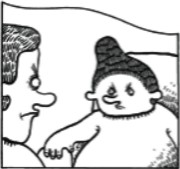|
There were certainly silly concatenated terms in the AD&D era, like bladesinger and Blackrazor. (Speaking of which, Moorcock was probably a big inspiration--Stormbringer, Mournblade, Runestaff, Dreamthief, Hawkmoon, Fireclown.) But it seemed to explode in the 3e era.
|
|
|
|

|
| # ? May 12, 2024 04:10 |
|
A shitton of non-germanic place names have really generic names lost to time. Applies to people names too, check how many peoples call their culture The People or People Who Speak or whatever and their neighbours Dumb Mutes What Dont Talk Right Eg the slavic word for slavic people is People Who Speak. The slavic word for germans is Mutes. The germanic word for germans is People. The cherokee word for themselves is anigiduwagi, Principal People. Thai means Free Man, as opposed to other ethnic groups who were serfs. China famously calls itself the Central Country.
|
|
|
|
I think this a thing where America is actually unusual in how much more distance we have between the names for places and their etymologies. We have places named in native languages, spanish, french, german, and person names that language has usually drifted long and far from what they originally meant. We're more used to names being seemingly random clumps of sounds and letters, and normal word names are more the exception than the rule (so we may just kind of grandfather in the normal word names as sounding more like "names" than other normal words). Britain is also littered with place names derived from languages no longer in use, but I think you can see more of the shadow of English in their names (or more accurately, the languages that would become English). I imagine that places with less invasions where the people there now speak closer to the same language as people who were there a thousand years ago (or alternately, more newly-inhabited areas that weren't as eclectically explored and named as the US), names would seem even closer to normal-rear end words. Sometimes in translation you get things where either translators have to think about whether to translate the name directly, or they have to add a footnote on what the name means because it would've been more commonly known in the original language's culture. I can even speculate that back in ye olden days, with less education or mass media, people would have less patience for weird names of distant places and just simplify with terms that they understand (it sure seems like some etymologies work out like that). And so, coming up with fake names for places and keeping them sounding like "names" that would have some kind of greater meaning isn't easy. Tolkien went through the trouble of working out entire fake languages to create the etymology of names (or maybe he was coming up with these fake languages and the story just kinda spilled out of it). Other writers are less creative or less able to get their head around weird sounds, and they may still want to keep the idea of meanings intact. So they just use English.
|
|
|
|
SlothfulCobra posted:Tolkien went through the trouble of working out entire fake languages to create the etymology of names (or maybe he was coming up with these fake languages and the story just kinda spilled out of it). It was very much the latter.
|
|
|
|
Omnomnomnivore posted:Compound words are a basic and very productive feature of Germanic languages, and Fantasy Stuff is heavily Germanic via Tolkien. East Asian languages also loving love compound words/names. And will often use only single syllables from the original words so you get very Newspeak sounding stuff. Hiroshima Dentetsu kabushiki gaisha turns into Hiroden, for a random one.
|
|
|
|
SlothfulCobra posted:I can even speculate that back in ye olden days, with less education or mass media, people would have less patience for weird names of distant places and just simplify with terms that they understand (it sure seems like some etymologies work out like that). This is how you get places that, when you look into their etymology, just mean 'Hill hill hill'
|
|
|
|
NikkolasKing posted:I dunno if this is really the right place to ask this but I've always wondered why Fantasy stuff loves to combine two words together and say "boom, a name." I always think of Skyrim and the Stormcloaks but it's pretty much everywhere in Fantasy fiction. The Persian Immortals were also known as the "Apple bearers" because they were issued spears with an apple-shaped counterweight, so that's kind of an example? Not sure if it's quite what you're looking for.
|
|
|
|
And the Norse name for Shetland was Hjaltlandseyjar or [Sword]hiltland Hjalt is both a word for a specific part of the sword as well one of the many names for swords the Norse used for the entire sword1. 1 See also: hjörr, hrotti, höguðr, dragvandill, gróa, gramr, gellir, gjallr ok neðanskarðr, sigðr , snyrtir, sómi, skjómi, skálkr, skerkir, stúfr, skrýmir, laufi, öltírr, langbarðr, ormþvari, leggbiti, kýrr, Leifnis grand, herberi, hneitir, hafrakan, lotti, hrönduðr, lögðir, mækir, mönduðr, mundriði, mistilteinn, málmr, þrór, marr, miðfáinn, fetbreiðr, grindlogi, fjörsoðnir, vægir, veigarr, vallangr, brandr, verr, úlfr, valnir, vindbjartr, kvöl, askr, angrvaðill, eggjumskarpi, svipuðr, svipaljótr, salgarðr, hnefi, hvati, höfuðhvessingr, hausamölvir, hrævagautr, herbrái, holdmímir, bensogr, brigðir, brimir, huglognir, skyggðir, skreyfir, skarðr, grindlogi, mismungr, fellir, málvitnir, taurarr, hrævarðr, trani, vindþvari, liðnir, kvernbiti, ljómi, herðir, vitnir, ýfrir, veggjalestir, skelkvingr, fylvingr, flæmingr, skerðingr, skotningr, skilfingr, sköfnungr, rifjungr, brotningr, hvítingr, bæsingr, tyrfingr, hækingr, hingr,, logi, mundgjallr, langhvass, eldr, örn, eygir, naglfari, brigðir, mörnir, blær, skerðir, hyrr, helsingr, hríðir, atti, fellir, fölvir, fáfnir, raufnir, imnir, eimnir, afspringr, þinurr, sigðir, snyrtir, svelgr, skarr, nár, góinn, gestmóinn, gárr, þrimarr, níðhöggr, oddr, blóðvarta, benknúar, blóðrefill, blóðvarp, blóðiða, blóðvaka, ljúgfengr, blóðhnefi, iðvarp, brandr, eggteinar, fólk, emjar, þremjar, ölröðarnautr, merki, véttrim, missifengr, ánn, skafningr, undirdregningr, vargr, Kaldhamarsnautr, valböst, herðr, sverð (duh), gelmingr, samnagli, hugró, hjalt ok tangi, sigrhnoð, mundríðr, höggfáðr, meðalkafli. A lot of these are also names of other phenomenon (wolf, metal, eagle, etc.)or even mythical creatures (Fáfnir, Níðhöggr). Some might be names of specific swords rather than swords in general. Some are really cool like "blóðhnefi" (Bloodfist) and hausamölvir (headsmasher). Others are a bit low effort like langhvass (longsharp).
|
|
|
|
Hippocrass posted:This is how you get places that, when you look into their etymology, just mean 'Hill hill hill' And then, when you look a little further into their etymology, you discover they don't actually mean 'hill hill hill'
|
|
|
|
Fantasy names based on actual words are so much better than when the authors just make up nonsense “alseus of navelium went with the flermod to narshargth” or the like, it drives me nuts because there’s almost never any logic to it and it ends up feeling super shallow. But then my stance on fantasy in general is that it mostly sucks and is shallow so SlothfulCobra posted:I imagine that places with less invasions where the people there now speak closer to the same language as people who were there a thousand years ago (or alternately, more newly-inhabited areas that weren't as eclectically explored and named as the US), names would seem even closer to normal-rear end words. Korea had a big renaming in the… 1500s I think, when formerly native place names all over the country got changed into sino-Korean words. But in that sense it probably makes them more intelligible today than had they been from archaic Korean words. Seoul is one of the exceptions, funnily enough though, maybe coming from the ancient native term for capital “Seorabeol.”
|
|
|
|
mrpwase posted:And then, when you look a little further into their etymology, you discover they don't actually mean 'hill hill hill' But you do get a lot of the River River or the River Water in Britain
|
|
|
|
Koramei posted:Fantasy names based on actual words are so much better than when the authors just make up nonsense “alseus of navelium went with the flermod to narshargth” or the like, it drives me nuts because there’s almost never any logic to it and it ends up feeling super shallow. Gene Wolfe wrote a fun fantasy novel that’s the supposed journal of an amnesiac god-haunted mercenary who gets involved in the Greco-Persian wars. Anyway the guy turns out to be a Roman and translating most Greek proper names into his vernacular (which Wolfe “translates”), so the invaders were repelled by the city-states of Rope and Thought at the Battle of Clay.
|
|
|
|
Foxtrot_13 posted:But you do get a lot of the River River or the River Water in Britain You also get imaginative names like Exmoor, Exton, Exebridge, Upexe, Nether Exe, Exeter, Exminster, and Exemouth.
|
|
|
|
In Iceland basically everything is compound words. Like police is Laworderman, kite is flyingdragon, soda is erruptiondrink, and rental car is carrentalcar (to differentiate it from a taxi which is just a rentalcar). So that sort of thing in fantasy never bothered me because it just seems like the natural way to create a word.
|
|
|
|
It happens all the time in English too, so often people don't notice it like racecar, cheeseburger, and grandfather.skasion posted:Gene Wolfe wrote a fun fantasy novel that’s the supposed journal of an amnesiac god-haunted mercenary who gets involved in the Greco-Persian wars. Anyway the guy turns out to be a Roman and translating most Greek proper names into his vernacular (which Wolfe “translates”), so the invaders were repelled by the city-states of Rope and Thought at the Battle of Clay. Wolfe hearing people bitch about how archaic or made up sounding the words in Book of the New Sun were and deciding to "translate" everything in Latro is hilarious.
|
|
|
|
there's also plenty of names (well, nicknames really) throughout history where if you didn't know anything about them you'd think someone was writing an edgy fantasy character. The Black Prince, Vlad the Impaler, Jack the Ripper, Bjorn Ironside, The White Death, Charles the Hammer, The Lion of the North, The One-Eyed Dragon, and so on.
|
|
|
|
There is a Russian geologist named Mstislav Mstislavovich Mstislavski which is basically "Vengeance McVengeance Vengeanceson"
|
|
|
|
FreudianSlippers posted:In Iceland basically everything is compound words. Like police is Laworderman, kite is flyingdragon, soda is erruptiondrink, and rental car is carrentalcar (to differentiate it from a taxi which is just a rentalcar). It's extremely common in mandarin too. Cat bear. Electric brain, etc.
|
|
|
|
Hill hill hill …. “The place of the three hills” was too long for every day speak?
|
|
|
|
Nah
Telsa Cola fucked around with this message at 01:24 on Sep 6, 2023 |
|
|
|
We Do Not Know the Population of Every Country in the World for the Past Two Thousand Years posted:Economists have reported results based on populations for every country in the world for the past two thousand years. The source, McEvedy and Jones’ Atlas of World Population History, includes many estimates that are little more than guesses and that do not reflect research since 1978. love the passive aggressiveness from maybe a bit of an insultingly amateur perspective, I've run into McEvedy and Jones a lot doing modding with Paradox games (map-based strategy games set in historical periods) and kind of had it in for it ever since, so I'm somewhat gleefull to see this takedown. Maddison also often seems like a lot of bullshit, but they're at least transparent where their guesswork came from. McEvedy and Jones is just constantly flagrantly wrong, but by dint of being easy to read with nice graphs and all in one place it's still the go to source among a lot of history nerd circles, it seems like.
|
|
|
|
My favorite baffling tautology is the La Brea tar pits, aka the the tar tar pits. Just because the name combines two very living languages that are both spoken by millions of people today in the area.
|
|
|
|
Offler posted:My favorite baffling tautology is the La Brea tar pits, aka the the tar tar pits. Just because the name combines two very living languages that are both spoken by millions of people today in the area. It’s a double warning…
|
|
|
|
SlothfulCobra posted:I imagine that places with less invasions where the people there now speak closer to the same language as people who were there a thousand years ago (or alternately, more newly-inhabited areas that weren't as eclectically explored and named as the US), names would seem even closer to normal-rear end words. Scandinavia is an example of this where almost all place names are named in ancient or old norse, the local old norse derivative language or Sami/Finnic. This is because the same general populations, and likely language groups, have dominated the area since at least 4000-5000 years ago and the invaders taking control of and settling the land have just been of the same local populations. There is a fun example of the opposite happening in places not really subjected to invasions. Papua new guinea is a place with really terrible terrain, very few riches to steal and a land that is fertile enough to reliably support the local populations. What has happened there is that all the secluded communities have kept and developed their own languages and the islands has more than 800 distinct languages of dozens of language families.
|
|
|
|
Offler posted:My favorite baffling tautology is the La Brea tar pits, aka the the tar tar pits. Just because the name combines two very living languages that are both spoken by millions of people today in the area. This is hilarious What do they call it in Spanish? "La the tar pozos de Brea"? (apologies for almost definitely botched Spanish grammar, I don't speak it at all)
|
|
|
|
On a related note, a lot of legal couplets (cease and desist, aid and abet, etc.) consist of two words that mean the same thing, but that entered English at different times: one word was to inform the Anglo-Saxon speakers, the other to inform the Norman French speakers.
|
|
|
|
Not quite that early iirc It would have been law French and Middle English. You are looking at the 1200-1500 time frame. Old English (Anglo Saxon ) was phasing out around the Norman conquest iirc Edit I guess there was some overlap at the end of Anglo Saxon and the French courts euphronius fucked around with this message at 13:45 on Sep 6, 2023 |
|
|
|
unrelated to current discussion, but a good excuse to use this smiley: 4 exceptionally preserved Roman swords discovered in a Dead Sea cave in Israel LITERALLY A BIRD fucked around with this message at 16:59 on Sep 6, 2023 |
|
|
|
euphronius posted:Not quite that early iirc Old English was ended as a language of governance by the immediate aftermath of the Norman conquest. William could not read it (though he claimed to have wanted to learn) and while he issued writs in English at first, increasingly became reliant on Latin text in his administration as it became evident that he was not going to be able to rule through English magnates. English continued as a vernacular (obviously) but with increasing influence from Norse and Norman French. In a few 11th and 12th century texts you can see this development taking place in real time, particularly the Peterborough Abbey version of the Anglo-Saxon Chronicle which goes from straight-up OE at the time of the Conquest: Peterborough Chronicle, AD 1066 posted:þa hwile com Willelm eorl upp æt Hestingan on Sce Michaeles mæssedæg Harold com norðan him wið gefeaht ear þan þe his here com eall þær he feoll his twægen gebroðra Gyrð Leofwine and Willelm þis land geeode com to Westmynstre Ealdred arceb hine to cynge gehalgode menn guldon him gyld gislas sealdon syððan heora land bohtan. to this, a long lifetime later: Peterborough Chronicle 1137 posted:For ǽvric ríce man his castles makede & aiǽnes him hélden. & fillden þe land ful of castles. Hí suenceden suíþe þe wrecce men of þe land mid castelwerkes þá þe castles wǽren maked þá fillden hí mid dévles & ivle men. Which still has plenty of Anglo-Saxon features of course, but if you read it out loud, almost the only things that will trip you up are the pronouns being a bit weird and trying to figure out what a “swencheden swithe” is.
|
|
|
|
Offler posted:My favorite baffling tautology is the La Brea tar pits, aka the the tar tar pits. Just because the name combines two very living languages that are both spoken by millions of people today in the area. Same with the Los Angeles Angels
|
|
|
|
LITERALLY A BIRD posted:unrelated to current discussion, but a good excuse to use this smiley: ”No sir no mister Decanius we can’t find them and we’ve looked everywhere. Yes I’ll take next watxh duty…”
|
|
|
|
LITERALLY A BIRD posted:unrelated to current discussion, but a good excuse to use this smiley:
|
|
|
|
echopapa posted:On a related note, a lot of legal couplets (cease and desist, aid and abet, etc.) consist of two words that mean the same thing, but that entered English at different times: one word was to inform the Anglo-Saxon speakers, the other to inform the Norman French speakers. I meant to come back around to this in my last post but I got too excited about the Peterborough Chronicle and forgot. But, while it is true that English has lots of redundant dual-origin vocabulary relating to the old English vs Norman (or later French) usages—ward/guard, cow/beef, corn/grain etc.—these kinds of specifically legal doublets are not solely based on this idea of redundancy/translation. Cease and desist for example are both Latin/French borrowings. And OE legal language used loads of these set-phrases before the Normans ever showed up. Toll and team, infangthief and outfangthief, sac and soc—the last one even got its own all-French equivalent, oyer and terminer! Maybe it’s just that lawyers always want their bases covered.
|
|
|
|
Doubling is indeed a linguistic tic that transcends the need to make patent documents legible to a two language but not bilingual community
|
|
|
|
My understanding of those legal pairings (backed up by a cursory google) is also that they're related but slightly different terms, not just repetition. So "cease and desist" isn't "stop and stop" it's "stop any current activity and don't do any more of it", aiding is actively assisting while abetting is just encouraging the commission of a crime, etc.
|
|
|
|
That true for last will and testament but and some others by I’m not sure about all.
|
|
|
|
cheetah7071 posted:You don't need to be a disbeliever or a charlatan to get the results you want from a reading. In messy datasets (literally messy, for entrails), if you go in predisposed to be looking for a specific answer, you will probably find it. All it requires is that the process be complicated enough, and require enough judgment calls, that the same omens might plausibly be read differently by two non-charlatan diviners. Economists and any economic advice.
|
|
|
|
Stolen and re-stolen from another thread, wondering how accurate this is. euphronius posted:That true for last will and testament but and some others by I’m not sure about all. I'm sure quite a few examples were put that way just because it was the thing you did. Of course, similar principle; that the couplings cover bases and help clarify your meaning as well as merely providing emphasis and sounding catchy. In a language with so much ambiguity and specificity as English it helps to be as clear as possible in legal texts. Comstar posted:Economists and any economic advice. This is mostly just neoclassical Western economics, but very much so in that field.
|
|
|
|
Ghost Leviathan posted:Stolen and re-stolen from another thread, wondering how accurate this is. what a way to summarize song
|
|
|
|

|
| # ? May 12, 2024 04:10 |
|
Ghost Leviathan posted:Stolen and re-stolen from another thread, wondering how accurate this is. 100%
|
|
|








































